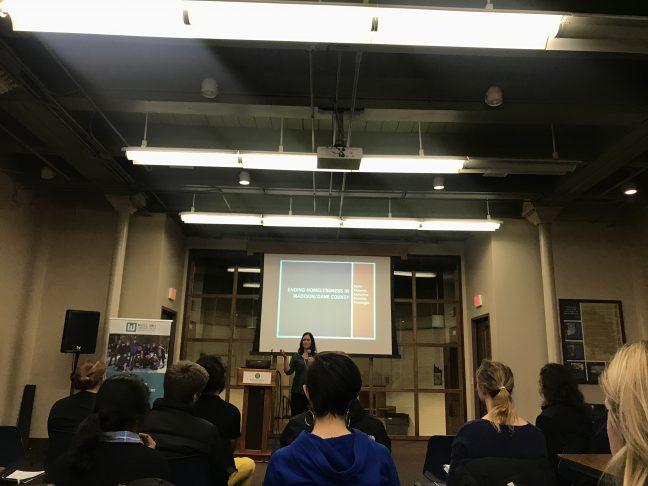Willis L. Jones Leadership Center hosted Porchlight’s Executive Director Karla Thennes and student representative for Campus Food Shed Angad Dhariwal to discuss homelessness and food security on and off campus Tuesday evening at University of Wisconsin’s Memorial Union.
According to Thennes — who has been the executive director for two years but has been with the nonprofit since the early 90s — Porchlight is the largest non-profit organization of housing and services to homeless and low-income persons in Dane County. The organization has multiple locations across Dane County, but Grace Episcopal Church is where it has its roots.
“It was supposed to be temporary,” Thennes said of the Brooks Street location. After two homeless people died in 1985 by freezing to death, the shelter was opened. Thirty-three years later and “We’ve been here ever since,” she said.
Paper from Wisconsin Coalition Against Homelessness could be influential in next state budget
Porchlight includes six core programs: a drop in shelter, an eviction prevention program, Porchlight Products produced by program members, affordable housing, outreach and Safe Haven for those suffering from mental health disorders.
An organization like Porchlight is crucial to the city and state because underemployment, unemployment, lack of support and stability, substance abuse, mental health and racial inequality are some of the many reasons homelessness continues to persist, Thennes said. She added that the lack of affordable housing in Madison is one of the most significant factors in perpetuating the cycle of homlessness.
According to Thennes, Madison has seen a 13.65 percent price increase in one bedroom housing from 2017 to 2018, making already unaffordable housing even more unattainable for homeless and low-income persons.
Thennes explained that Porchlight makes housing as readily available to the homeless as possible. She outlined the changes made from Porchlight’s early days to now, including priority wait lists, participant-driven case management and resources for treatment and counseling included in the housing program.
“While these changes are relatively new, anecdotal evidence suggests costs savings to our community,” Thennes said.
Madison recommends $4.5 million for affordable housing developments
Since 2015, there has been a 24 percent drop in single-person homelessness and a 42 percent drop in the number of homeless families, Thennes pointed out. She added that the number of homeless people did rise this year.
Thennes highlighted strategies other than housing to combat homelessness — including prevention and diversion of homeless before it begins, outreach focused on unsheltered homelessness and emergency shelters and needs services.
The program currently allows 90 free nights in the shelter to any person each year, and 1,200 men are serviced annually by the non-profit. Breakfast and dinner are served daily by 70 different volunteer groups 365 days a year, Thennes said.
Overdue: As the city expands affordable housing, barriers for those in need persist
Thennes described the “Built for Zero” initiative, in which goals were set in 2015 to end homelessness for 130 veterans and 135 individuals who were chronically homeless by 2016. In the end, 265 veterans were housed, and 254 chronically homeless people were moved into housing between 2015 and 2017. The initiative has since continued and has set goals for homeless families and unaccompanied youths.
A partnership with Memorial Union has also been cultivated, Thennes said, where disabled persons from the program are given the opportunity to work and get paid.
“It has been a wonderful partnership that has worked out well,” Thennes said.
Other campus initiatives to combat another social justice issue, food insecurity, are in place. Dhariwal spoke on behalf of the Campus Kitchens Project that attempts to bridge the gap between food waste and food insecurity.
Dhariwal shared that 26 percent of students who participated in a survey conducted by his organization reported being food insecure, meaning they lack affordable and/or nutritional food.
Dhariwal explained that by partnering with dining halls on campus, food that would have otherwise gone to waste is repurposed and used to feed students at a free, biweekly campus meal. The organization has served roughly 2,400 meals.
Moving forward, both organizations hope to serve more students and community members to help alleviate the issues of homelessness and food insecurity in the Madison community.














